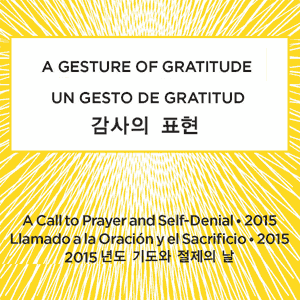From the United Methodist Women National Office website:
www.unitedmethodistwomen.org
 This annual observance gives local and district units a chance to study and reflect on a particular theme each year and to designate funds for ministries related to the theme for the year.
This annual observance gives local and district units a chance to study and reflect on a particular theme each year and to designate funds for ministries related to the theme for the year.
This Year’s Theme
In 2015, the offering received will go toward the pensions and health care of retired deaconesses and missionaries.
One hundred percent of the offering will go directly to provide health and pension support for retirees.
Read the letter from the 2015 Call To Prayer and Self-Denial
(English, Korean and Spanish in one PDF)
Order online Order printed copies free of charge
Order online Get Call to Prayer resources through the e-store
Many Call to Prayer resources can be downloaded and printed
(Scroll down to Call to Prayer section.)
Frequently Asked Questions about Grants
Planning an Observance
We encourage you to commemorate A Call to Prayer and Self-Denial on one day during the first few months of the year.
Be creative. The following ideas offer some possibilities:
- Plan a dedication service based on the PDF order of worship reproduced from the Program Book.
- Plan a quiet day or retreat for all members of your unit and anyone interested. Use the appropriate year’s Quiet Day Service in the United Methodist Women Program Book, available through the e-store.
- Plan a prayer vigil for your church or unit using the Prayer Calendar along with the Quiet Day Service.
- Explore with your pastor the possibility of having your United Methodist Women unit lead a Quiet Day Service for a Sunday-morning worship service.
- Prepare a meal as part of a year’s observance.
- Distribute the Prayer Card to members who are absent. Order additional cards to give to friends.
- Giving Makes a Difference
By your sacrificial giving to A Call to Prayer and Self-Denial, you, United Methodist Women members and predecessor organizations over the years have:
- Built and equipped schools, libraries and clinics
- Trained rural and urban women for specialized ministries
- Provided nutrition and medical assistance for thousands of women, children and youth
- Offered relief to those uprooted by wars and other disasters
- Advocated for public policy changes to benefit women and children
- Produced long-term economic benefits through income-generation and other self-help projects